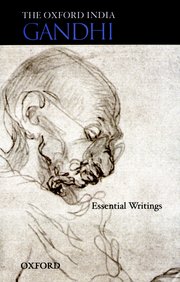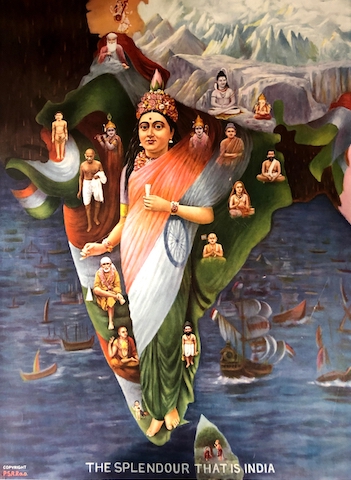
Library copies: Worldcat.org >>
Gandhian social movement >>
GOD FORBID that India should ever take to industrialism after the manner of the West. The economic imperialism of a single tiny island kingdom (England) is today keeping the world in chains. If an entire nation of 300 millions took to similar economic exploitation, it would strip the world bare like locusts. Unless the capitalists of India help to avert that tragedy by becoming trustees of the welfare of the masses and by devoting their talents not to amassing wealth for themselves but to the service of the masses in an altruistic spirit, they will end either by destroying the masses or being destroyed by them.
Young India 20-12-1928; CWMG Vol. 38, pp. 243-4; E
Capitalists Of India
Wardha
Before 20 December 1928
Source: Gopalkrishna Gandhi.The Oxford India Gandhi: Essential Writings. New Delhi: Oxford University Press, 2008, pp. 276-7
The Oxford India Gandhi looks beyond the plaster-cast image of Mohandas Karamchand Gandhi, the Mahatma. Gandhi’s autobiography ends in the late 1920s, several historic years before his assassination in 1948.
This book seeks to fill the void left by Gandhi himself. Edited by Gopalkrishna Gandhi, the book tells Gandhi’s story in his own words–the story of his life as he himself might have narrated it to a grandchild. […]
The Oxford India Gandhi offers a look into the personal life of one of the subcontinent’s most public figures of all time. Part of Oxford University Press’s prestigious ‘Oxford India Collection’, the book is as much for those who know Gandhi, including students and scholars of Indian history and culture, as for young readers encountering the Mahatma for the first time.
Source: The Oxford India Gandhi: Essential Writings By Gopalkrishna Gandhi – Trade-Reference – Political-Leaders-Leadership
URL: https://india.oup.com/product/the-oxford-india-gandhi-9780195692525
Date Visited: 1 May 2023
“The aim of University education should be to turn out true servants of the people, who would live and die for the country’s freedom.” – Mahatma Gandhi
“Mahatma Gandhi University envisions to champion the cause of higher education in the country by catering to the scholastic, expertise and developmental needs of the individual, the society and the industry through the creation of a critical knowledge base with well-defined means for its dissemination and extension for the society’s sustained and inclusive growth.”
Source: M.G University Kerala
Address : http://www.mguniversity.edu/
Date Visited: Thu Mar 21 2013 14:04:31 GMT+0100 (CET)
“Mahatma Gandhi University envisions to champion the cause of higher education in the country by catering to the scholastic, expertise and developmental needs of the individual, the society and the industry through the creation of a critical knowledge base with well-defined means for its dissemination and extension for the society’s sustained and inclusive growth.”
Prof (Dr.) Rajan Gurukkal
Vice-Chancellor
Source: Vision
Address : http://www.mguniversity.edu/index.php?option=com_content&view=article&id=17&Itemid=536
Date Visited: Thu Mar 21 2013 14:06:06 GMT+0100 (CET)
The aim of this institution is to develop highly skilled professionals who are specially trained so as to overcome the existing imbalances in the health caring system. Academic training and practice to students are imparted in collaboration with a number of established hospitals in the public and private sector.
Source: Mission
Address : http://www.sme.edu.in/main/mission.asp
Date Visited: Thu Mar 21 2013 14:08:28 GMT+0100 (CET)
Many people such as Martin Luther King, Nelson Mandella, Dalai Lama, Aung San Suu Kyi, etc. have followed the path shown by Bapu and have brought prosperity to themselves and their societies. It is often misunderstood that Gandhian principles are too hard to be followed by a common man. To break this myth we share success stories of common people who have followed Bapu’s teachings and prospered. We believe that Bapu’s teachings are much like science – they can be practised by anyone, anywhere, anytime, and would produce the same results – prosperity and welfare.
Complete Information on Mahatma Gandhi : www.mkgandhi.org
Source: About Us
Address : http://www.mkgandhi.org/ias.htm
Date Visited: Thu Mar 21 2013 14:11:00 GMT+0100 (CET)
Mahatma Gandhi said that seven things will destroy us. Notice that all of them have to do with social and political conditions. Note also that the antidote of each of these “deadly sins” is an explicit external standard or something that is based on natural principles and laws, not on social values.
Source: Seven Deadly Sins as per Mahatma Gandhi
Address: https://www.mkgandhi.org/mgmnt.htm
Date Visited: 27 July 2021

Quote and image © Vinay Lal (private collection)
P. S. R. Rao, “The Splendour That is India”, Madras, 1947-48 | The Art of the Freedom Struggle in India >>
Related posts: Gandhian social movement >>
The Art of the Freedom Struggle in India
By Vinay Lal, Posted on August 12, 2022 | Read the full article here >>As India prepares to celebrate the 75th anniversary of its independence on August 15th, attention will naturally gravitate towards those who were the principal architects of the movement that gave us azaadi. In the current mood, and under the present political dispensation, one can be certain that even though the putative “Father of the Nation”, Mahatma Gandhi, will be mentioned in the usual pious tones, many others will be celebrated as the greater architects of the freedom struggle. […]
One way to comprehend what was transpiring during the freedom struggle and in its immediate aftermath is to understand how artists at that time responded to the events unfolding before them. A very small if sophisticated body of work has emerged around this subject, but what has been written on it—often in obtuse language—is largely for scholars, all the more ironical because much of the art of that time is ephemeral, more like bazaar art, and one would imagine that the scholars who have sought to rescue this work from oblivion are sensitive to the fact that bazaar art is after all for the bazaar, that is for common people. What becomes evident from a perusal of the art is that the artists and printmakers saw in Gandhi the supreme embodiment of the aspirations of a people striving to be free. They unhesitatingly turned Gandhi into the presiding deity of the political landscape. By far the greatest number of nationalist prints, as they may be called, feature him and the political events and the political theatre to which he gave birth—whether it be the Champaran Satyagraha, the noncooperation movement, the no-tax campaigns such as the Bardoli Satyagraha, the Salt Satyagraha, or the Quit India movement. What is even more extraordinary is that the printmakers and artists also unhesitatingly placed him, and him alone of all the political luminaries of that time, as akin to the founder of religions and as the true inheritor of the spiritual legacy of Indian civilization. […]
Much of this artwork has only in recent years begun to receive the critical scrutiny of historians and other scholars. These prints do not only tell the story of the freedom movement; rather, they helped to forge the identity of the nation. What kind of art will do the same at this critical juncture of India’s history remains to be seen.
Source: “The Art of the Freedom Struggle in India” by Vinay Lal (Professor of History & Asian American Studies, University of California, Los Angeles UCLA) in (Lal Salaam, 12 August 2022)
URL: https://vinaylal.wordpress.com/2022/08/12/the-art-of-the-freedom-struggle-in-india/
Date Visited: 18 August 2022
[Bold typeface added above for emphasis]
FACT CHECK GANDHI QUOTE
Journalist: What do you think of Western civilization?
Gandhi: I think it would be a good idea.
Unfortunately, I have not been able to find any solid citations for this sharp exchange:
Quote Investigator >>
“The issue is not whether the world’s economy is governable toward ambitious goals like promoting social justice, equality between countries and greater democratic control for the bulk of the world’s people, but whether it is governable at all.” – Mogobe B. Ramose quoting Globalization in question by Hirst, P. and Thompson, G in “Globalization and ubuntu” (The African Philosophy Reader), pp. 732 | Globalization >>